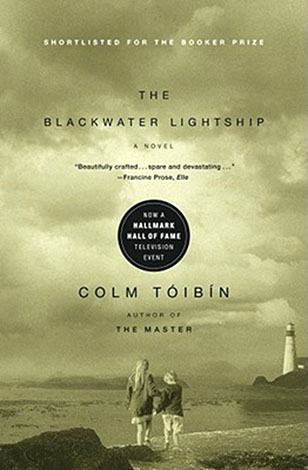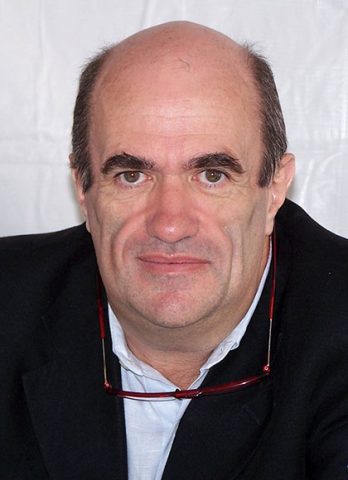 The Blackwater Lightship
The Blackwater Lightship
by Colm Toibín
Published by Picador
Published September 24, 1999
Fiction
288 pgs. • Find on Amazon.com
Reviewed by Stephen O. Murray
June 2, 2001
Colm Toibín’s fourth novel, The Blackwater Lightship (also the basis for a 2004 Hallmark Hall of Fame production starring Angela Lansbury and Dianne Wiest) seems like an early modernist (say Sean O’Casey) play about three generations of women that is set in the “new,” less bleak Ireland of the early 1990s.
The main character, Helen, is a 31-year-old principal of a Dublin school, married to unpatriarchal husband Hugh. He and their two young sons have gone ahead of Helen to Hugh’s family in Donegal when Helen is summoned to the hospital to see her brother Declan by a friend of his, Paul. By the time they get to the hospital, Helen learns that Declan has AIDS and has been very sick before.
Declan wants Helen to tell both their mother and grandmother what Paul has just told her. This would be a lot to ask of anyone but is even more epic a request for Helen, who has cut off relations with her mother and has only slightly more relations with her grandmother. If (a) having to go to talk to them, and (b) telling them that their doted-upon (grand-/)son, who is 29, is dying isn’t sufficiently onerous a task, Declan also wants her (c) to arrange for him to be transported from the hospital to stay at the grandmother’s house on the crumbling coastal cliffside of remote County Wexford (where gossip is intense).
Their maternal grandparents’ house is where Declan and Helen had been shipped while their father was dying in a Dublin hospital two decades earlier. Helen hated being there and blames her mother for many things. In retaliation for the perceived lack of emotional sustenance she had received from them, Helen invited neither her mother nor her grandmother to her wedding. Helen once made a dutiful trip to her grandmother’s with her husband and children. The children hated the visit, and Helen’s mother did not show up to meet her grandchildren.
So, we have all the accumulated bitterness for a real emotional slugfest, right? But there is the very sick Declan who wants to foster reconciliation, and all three generations of women want to please him by at least trying to get along. He is too sick for them to express their resentment at his having kept knowledge of his illness from all of them (only his mother failed to notice his homosexuality before this crisis).
And there is more: Declan also invites two of the gay friends who have been caring him to join him and the women of his family at the edge of the island. Even more bases for explosions!
In the week on the coast, there is a lot of talk. The very independent grandmother accepts the gay friends/caretakers. Helen resents having been excluded but knows that Declan has been sparing her to let her construct her own family, rather than expecting her to take care of him as she had when they were children. The family she has chosen or constructed encompasses her children’s paternal grandparents, but not Helen’s mother. In contrast, Declan sometimes visited his mother and grandmother, although keeping his illness a secret. It has been his gay friends who have cared for him. Until this visit, he has compartmentalized his circle of gay intimates and his “blood family,” though, unlike Helen, he has maintained relations with all three difficult and independent women.
His de facto mother, Paul, and the woman who gave birth to him, Lily, do clash. Lily tries to send him away—but the house is Dora’s (Declan’s grandmother) not hers.
Helen and Lily have at it, too. ‘’I’ve never trusted you again,’’ Helen tells her mother (after taking their father away to die and then having watched with horror Lily’s poise at the funeral). Lily replies, “I did what I could for you, and you never gave me an inch.’’ It is easy to believe the last! They are both tough, ambitious women, though now, as a mother herself, Helen finds Lily’s emotional distance from her offspring inconceivable.
There is some lyrical edge-of-the-world writing and considerable humor in the affectionate relationships that develop between the flinty grandmother and the gay visitors. The long-festering mother-daughter hurt and anger are plausibly drawn (though sometimes schematically asserted rather than fully dramatized). That the two do not see the ways in which they are similar is also plausible. And that the influx of gay men is a catalyst for disinterring resentments from their shallow graves (before Declan lands in a non-metaphorical one) also seems plausible to me. (Lanford Wilson’s Fifth of July pops to mind.)

The basis for Helen’s estrangement from Dora remains mysterious to me, however. And Declan’s function—to be dying so that the women can face their history of resentments—is very suspect. He is the one who charms everyone, and must pay with his life for that? To me, this is too much in the “The Gay Character Must Die” mold of 1950s and ’60s novels and movies. Also frustrating is that Declan is the least fully developed character (of those present—Helen’s absent husband and long-dead father are also sketchy, but are “offstage” characters). Declan’s function in the book is to bring the others together, to need care, and to elicit sympathy. His life between being a child too young to understand his father’s dying and playing the tragic early death (“Camille” more than the invisible death scenes of traditional fisherman lost at sea) is a blank. How did he make these friends who have been steadily there for him? They tell bits of their own life stories, but not what Declan was like when he was young, healthy, and gay.
Toibín’s striking previous novel The Story of the Night seems to me to include AIDS more organically. Here, it seems to me only a convenient device. (I did not think this of the PWA poet in Michael Cunningham’s The Hours, though that, too, is a novel about three women.)
Also, I found the backdrop of Argentina through the years of the terror in The Story of the Night more interesting than the vague background of Toibín’s homeland in this book. He is clearly a very talented writer, and Blackwater Lightship is certainly not without interest and has many compelling scenes. It just seems to me more contrived than is The Story of the Night.
I’ve left out Larry, the most engaging character of all, who is on the fourth of four brothers from the same family. (Dora warns him to “guard your heart,” something she, her daughter and grand-daughter seem too good at.) He is the one who gets to say: “In my family my brothers and sisters—even the married ones—still haven’t told my parents that they are heterosexual.”
first published on epinions, 2 June 2001
©2001, 2016, Stephen O. Murray

